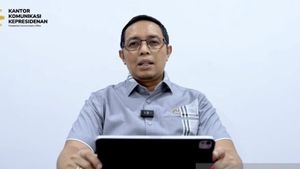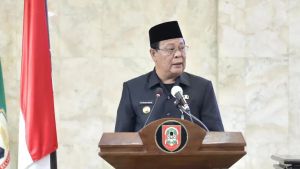JAKARTA - People who are members of the Serious Coalition for the Revision of the ITE Law say that the guidelines for implementing the Electronic Information and Transaction Law (UU ITE) do not solve the problem.
This coalition mentions that the Joint Decree on Guidelines for the Implementation of Certain Articles in Law Number 11 of 2008 concerning Information and Electronic Transactions (UU ITE) has been signed by the Minister of Communication and Information, the Attorney General of the Republic of Indonesia, and the Head of the Indonesian Police. a number of articles that are often used as a means of criminalization.
Not only that, before it was signed, the draft or the draft SKB was never opened to the public. This in turn makes this guideline minimally public participation and shows that the preparation process is not open.
"In fact, meaningful, effective and inclusive public participation is a very important part in respecting and fulfilling human rights. It cannot only be formal, but must be sustainable and include people's opinions and concerns in every decision," said the coalition representative, Damar Juniarto in a written statement quoted on Friday, June 25.
The coalition reminded that the guidelines, which have been in effect since Thursday, June 23, should not be considered as a replacement process for the revision of the ITE Law. "The issuance of this guideline must be considered as a transitional rule before the revision of the ITE Law," he said.
Damar also asked that the practice of making guidelines to answer problematic law revisions in the country should not become a habit. Thus, this coalition urges the ITE Law to be prioritized.
"One of the steps that must be taken by the government is to immediately submit a revision proposal and discuss it with the DPR RI," said Damar.
In addition, they also encourage the government to be more open and participatory in the process of drafting the ITE Law by involving communities affected by regulations.
Furthermore, the coalition also urges a moratorium on the ITE Law. The reason is that this kind of legislation revision will take a long time.
"The moratorium on cases of the ITE Law is important for the government – and in this case, not to process cases related to the rubber articles," said Damar.
"In addition, recovering victims who have been proven to be entangled in the rubber articles of the ITE Law is a form of human rights that must be fulfilled and carried out by the state now, in accordance with the International Covenant on Civil and Political Rights which has also been ratified by Indonesia," he concluded.
The English, Chinese, Japanese, Arabic, and French versions are automatically generated by the AI. So there may still be inaccuracies in translating, please always see Indonesian as our main language. (system supported by DigitalSiber.id)













